How to Fix Frizzy Hair in Humidity: Products and Tips
Updated on
This post may contain affiliate links. As an Amazon Associate, we may earn from qualifying purchases.
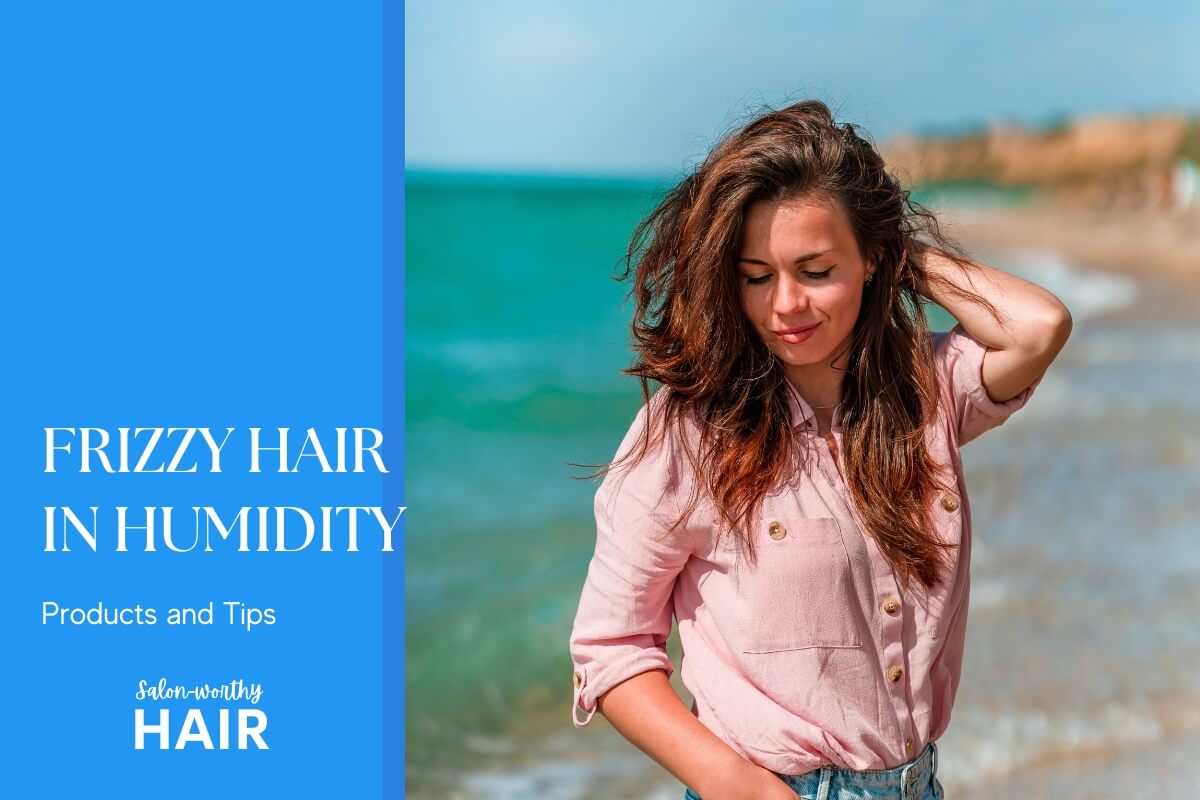
As the temperature rises, so does humidity and frizz in our hair.
It is that dreaded time of year when we are all desperately searching for quick ways to fix frizzy hair and figuring out why it happens in the first place.
So why does hair get frizzy when humidity is high?
Frizz occurs when humidity, the water vapor concentration in the air, is higher than the moisture content in your hair. Hair, being hygroscopic, naturally attracts and absorbs this humidity. As your hair takes in this excess, the water molecules disrupt its hydrogen bonds, causing them to break and reform. This alteration makes your hair swell and change shape, resulting in frizz.
Scientifically speaking, frizz starts to develop when ambient relative humidity is above 70%. A dew point above 60°F (15°C) can also saturate your hair with moisture. However, they are not strict thresholds. The effect on hair varies based on individual factors. Everyone’s hair is unique, and its reaction to humidity and dew point will differ based on several factors like hair type, porosity, level of damage, and your hair care routine.
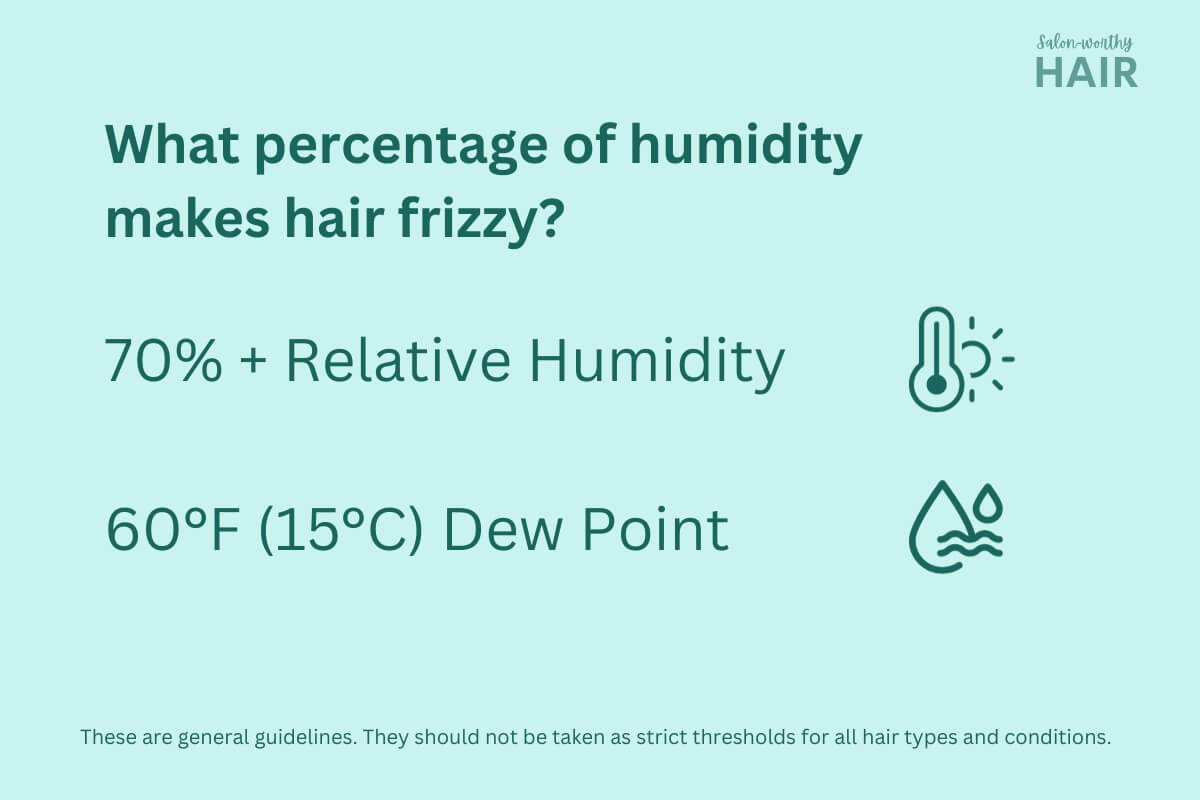
Regardless, stopping seasonal frizz, especially in high humidity, essentially boils down to 2 simple hair care tips:
- Keep your hair moisturized.
- Protect your hair.
So, let me show you how to stop your hair from frizzing in high humidity.
Table of Contents
- 1. Use a Leave-In Conditioner
- 2. Use An Anti-Humidity Hair Spray
- 3. Lock Your Hairstyle In Place
- 4. Keep Your Hair Up
- 5. Carry Anti-Frizz Sheets In Your Pocket
- 6. Use a Climate Control Gel on Curly Hair
- 7. Stay In Air-Conditioned Spaces
- 8. Use a Straightening Balm for Straight Hair
- 9. Consider An Anti-Frizz Hair Treatment
- 10. Rinse Your Hair With Sparkling Water
- 10. Check the Frizz Forecast
- What Are the Best Products for Frizzy Hair in Humidity?
- Make Your Hair Humidity-Proof and Frizz-Free!
1. Use a Leave-In Conditioner
A leave-in conditioner is a hair care product applied after washing and left in the hair without rinsing. Unlike regular in-shower hair conditioners, a leave-in conditioner provides prolonged moisture and protection while also sealing the outer layer of the hair, the cuticle.
I use John Frieda’s Frizz Ease Daily Nourishment leave-in conditioner during summer to help my hairstyles hold up to humidity all day. This product is so effective that it detangles, protects, hydrates, and keeps my hair frizz-free and touchably soft until my next hair wash.
The science of a leave-in conditioner lies in its dual action: sealing hair cuticles and repelling external moisture with ingredients like oils and silicones. It is a practical choice due to its ease of use, providing an ongoing defense against relentless moisture, making hair resilient, softer, and frizz-free even in challenging humid climates.
What I love about John Frieda’s leave-in conditioner is that you can use it on freshly washed or dry hair. Besides taming frizz, it can also protect your hair from heat damage when blow-drying or straightening.
Here are some tips to get the best results from using a leave-in conditioner to combat humidity:
On wash days:
- Wash your hair first with a moisturizing anti-frizz shampoo.
- Follow up with a good conditioner.
- Detangle your hair while it’s still saturated with conditioner.
- Rinse out the conditioner.
- Do a final rinse with cold water – this helps to close the cuticles.
- Towel dry your hair with a microfiber towel until it’s damp (but not completely dry).
- Apply the leave-in conditioner to damp hair.
- For optimal results, blow-dry the hair after application.
On non-wash days:
- Apply the product with your hands.
- Distribute it evenly.
- Style your hair as usual.
- Pay attention to how much product you use to avoid buildup and greasiness.
2. Use An Anti-Humidity Hair Spray
A hair spray protects your hair from humidity and wind and sets your hairstyle in the desired shape. Hair spray is made with propellants that deliver a fine mist to coat your hair strands lightly, allowing for style retention without a heavy or greasy feel.
The best anti-humidity hair spray is the Color WOW Dream Coat Supernatural Spray.
Created by a team of frizz experts and celebrity hairstylist Chris Appleton, the Color WOW Dream Coat hair spray is a favorite among A-list celebrities like Jennifer Lopez and Kim Kardashian.
This hair spray has garnered over 37,000 5-star ratings per Instyle Magazine, hailed as the “best hairspray to combat moisture and frizz.” Chris describes this innovative hair spray as a “raincoat-like shield” that repels moisture to prevent frizz and unwanted volume, even in high-humidity conditions.
The Color Wow Dream Coat hair spray is a dual-action anti-humidity and anti-porosity treatment ideal for extremely dry and humidity-reactive hair. The product effectively “waterproofs” your hair upon application, delivering super strong hydrophobic humidity-resistant protection.
Another admirable feature of the Color Wow Dream Coat hair spray is its ability to provide a glassy-sleek finish and smooth hair that can last 3-4 shampoos.
To use the Color Wow Dream Coat hair spray, follow the instructions below:
- Apply to towel-dried hair.
- Divide hair into sections and apply from root to ends.
- Comb through to distribute the product evenly.
- Blow dry to activate the anti-humidity properties of the hair spray.
- You can use a hairbrush while blow drying to shape your hair, ensuring the hair spray is evenly distributed.
This hair spray makes achieving and maintaining a sleek, frizz-free look through muggy, rainy, and humid days a breeze. It works for all hair types, including extremely dry, curly, coily, and kinky.
3. Lock Your Hairstyle In Place
Locking your hairstyle in place with strong hold hair styling products provides a dual benefit: it ensures your hair retains its set style and offers protection against damp surroundings. By creating a barrier against moisture and ensuring a firm hold, these products keep your hair frizz-free and styled to perfection.
To achieve a locked-in hairstyle, various hair styling products are employed. These can range from gels, mousses, and sprays to creams and serums. Stronghold hair styling products lock the hair strands in place to prevent them from losing shape and style.
A firm hold means the hair is less likely to move out of place, become unruly, or be disrupted by high humidity. Strong-hold hair styling products create bonds between hair fibers, ensuring your hairstyle remains set and intact.
A significant advantage of locking your hairstyle with styling products is the moisture resistance they offer. These products coat the hair strands, making them less permeable to external moisture. The coating ensures that the hair doesn’t absorb excess moisture from a steamy or waterlogged atmosphere, which is a direct cause of frizziness.
The firm hold and moisture-resistance combination ensures your hair does not deviate from its natural pattern, whether at the beach, caught up in the rain, or battling a windy day!
Another good trick is keeping your hair up if you are not into fancy hairstyles and prefer low maintenance.
4. Keep Your Hair Up
Keeping your hair up to combat frizz in high humidity reduces surface exposure and limits moisture interaction. Hairstyles such as buns, ponytails, braids, and updos are stylish and practical solutions in the tropical heat.
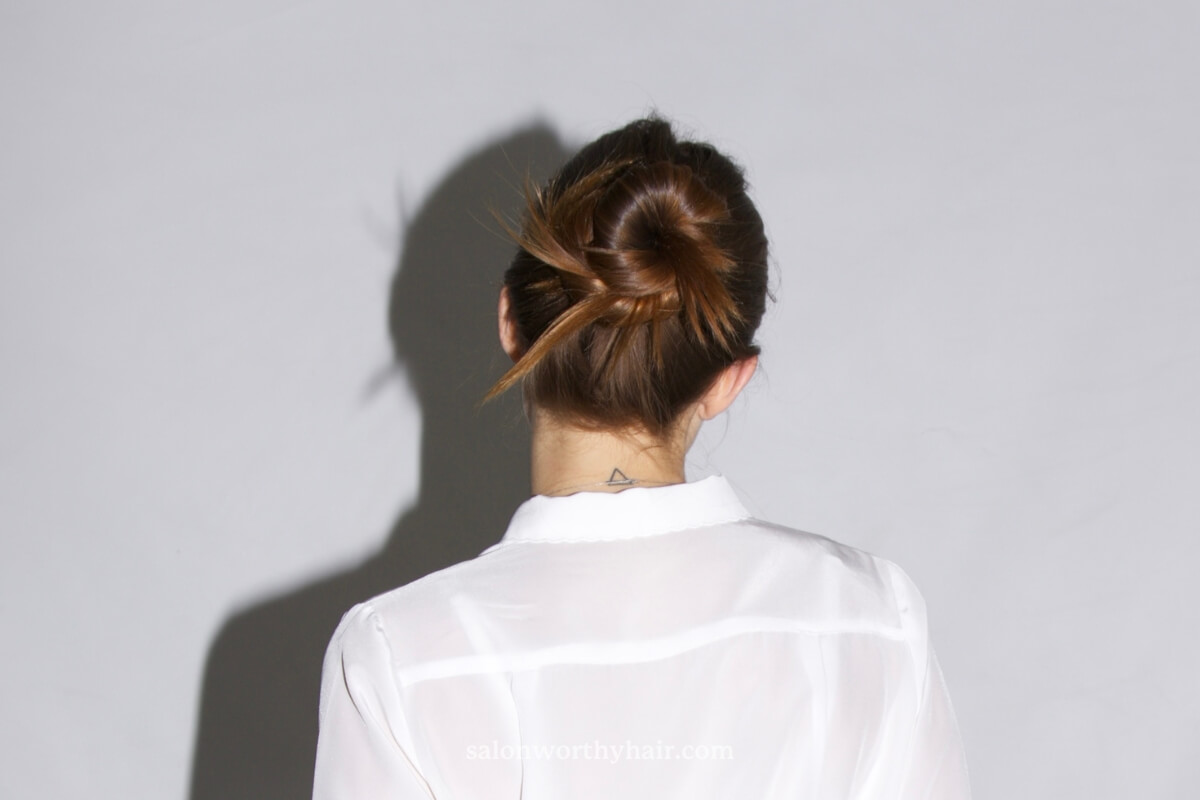
Trust me, wearing your hair in a bun is less effort and accommodating for the hot weather.
When your hair is wrapped or tied up, there is less hair freely hanging and exposed to muggy conditions, minimizing the chances of moisture absorption. Braids, in particular, can lock the hair, preventing it from expanding and frizzing up. Updos can elegantly keep your hair in place and protected, especially the ends, which are often more prone to frizz due to damage or split ends.
Additionally, wearing protective accessories like silk or satin scarves can shield the hair from humidity. These materials don’t absorb moisture much as cotton, ensuring your hair remains frizz-free.
5. Carry Anti-Frizz Sheets In Your Pocket
Anti-frizz hair sheets are specially designed wipes infused with hair smoothing and protective ingredients. These sheets are excellent for traveling and for those who are constantly outdoors in the summer – says Jen Atkin, the most influential hairstylist in the world, according to the New York Times.
Jen Atkin calls them the quickest and most effective solution to tame frizzy hair on the go without water or traditional anti-frizz hair products.
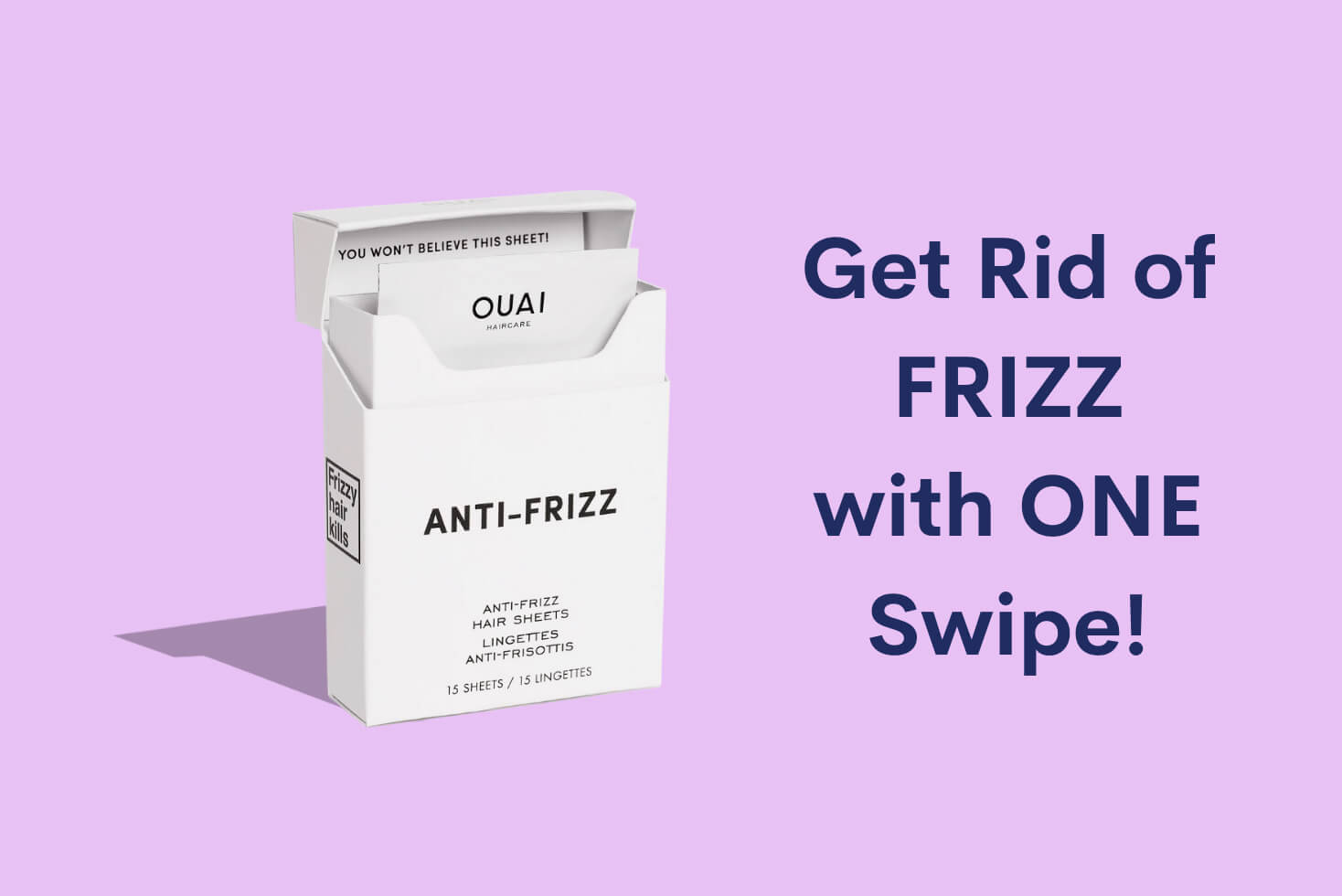
Anti-frizz hair sheets are convenient to use and easy to carry around. Unlike gels, creams, or sprays, these sheets are discreet, mess-free, and easily carried in a purse or pocket. A quick swipe with one of these sheets can make a noticeable difference whenever your hair starts acting up.
These hair sheets are infused with instant smoothing agents that work upon application. Gliding the sheet over your hair tames flyaways, reduces static, and gives your hair a smoother appearance.
Best anti-frizz sheets to fix frizzy hair quickly.6. Use a Climate Control Gel on Curly Hair
To prevent curly hair from frizzing in humidity, use a hair gel like the Ouidad Climate Control Gel.
Curly hair, a distinctive hair type, is celebrated for its unique texture and shape, characterized by spirals or coils that differentiate it from straight or wavy hair. Curly hair is different because of the shape of its follicle, which tends to be more oval or flat, influencing the curliness of the hair. The protein structure within the hair shaft and the arrangement of cells further contribute to its curly nature.
Curly hair can have varying curl patterns, with the degree and type of curl ranging from loose waves to tight coils among different individuals. But regardless of curl patterns, one thing all curly have in common is dryness. Curly hair is naturally dryer than other hair types due to a lack of natural oil (sebum) from the scalp that reaches the hair shaft. The twists and turns of curly strands make it challenging for sebum to travel down the hair, resulting in less natural lubrication for the hair’s length.
Humidity can heavily influence curly hair due to its inherent dryness, often leading to increased curliness.
Applying hair gel can highly benefit curly hair in humid conditions. A hair gel is a versatile hair styling product known for its hold and structuring capabilities. Due to its unique formulation, including polymers and fixatives, a hair gel allows for swift styling, while its viscosity ensures an even application.
Hair gels are adept at forming a protective barrier around the hair shaft, sealing in moisture, and keeping excess humidity out with anti-humectants like Panthenol. A hair gel maintains the shape of your curls and reduces frizz. Moreover, it can provide hold and definition to curls, showcasing the natural texture in a controlled manner. By limiting the interaction between curly hair and humidity, a good gel helps to tame and define curls.
Here’s my favorite product to control frizz in curly hair when humidity is high:
7. Stay In Air-Conditioned Spaces
Air-conditioned spaces have controlled humidity levels, relieving hair exposed to external high humidity.
An air conditioner is a device primarily designed to regulate indoor temperatures. However, an often overlooked benefit of air conditioners is their ability to control and reduce indoor humidity.
My hairstylist always told me that if I ever struggle with frizzy hair outside, find the nearest place with air conditioning and step inside for a few minutes. The cold, dry air will settle your hair and reduce the puffiness. If you can’t go indoors, try standing under an overhang or awning – getting out of the direct humidity will help.
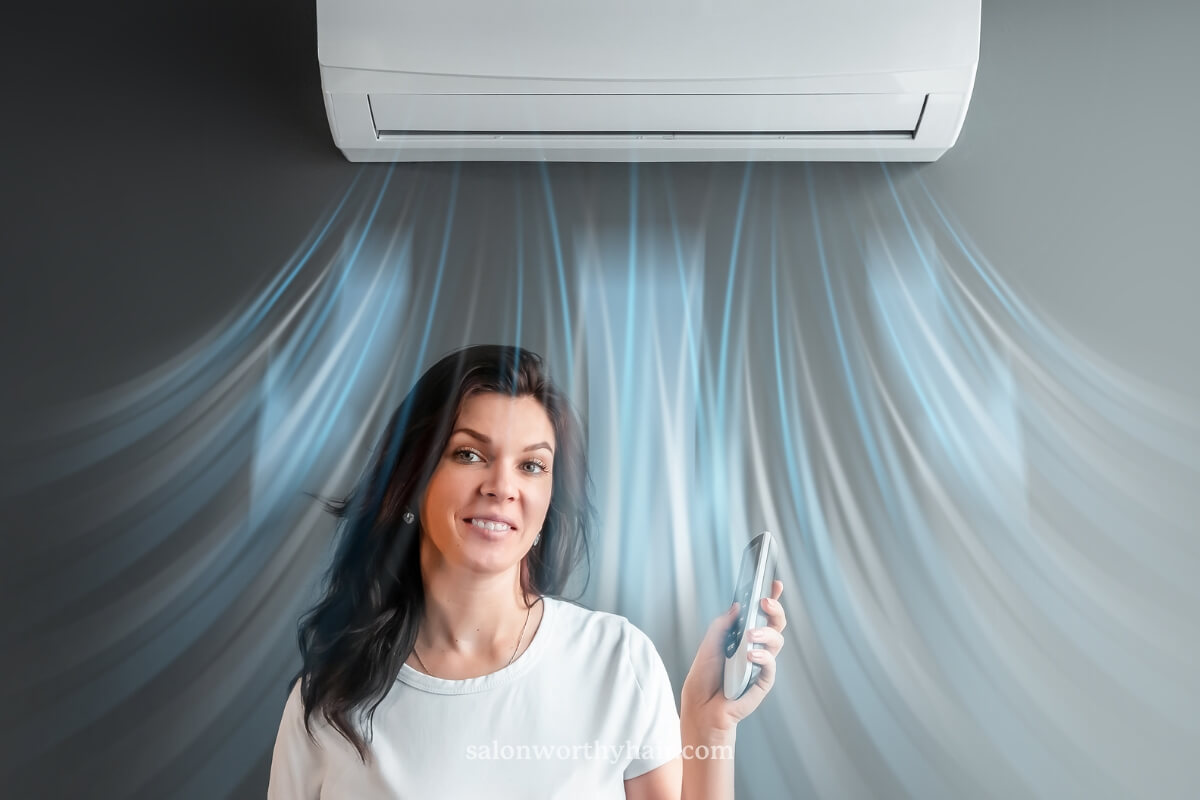
One of the primary functions of an air conditioner is humidity reduction. It cools the indoor air and removes excess moisture, ensuring the indoor environment remains less humid than the outside. Reduced humidity can relieve your hair and allow it to settle and refresh.
The controlled environment indoors makes hair less prone to sudden changes in humidity, ensuring a stable atmosphere that maintains hair’s natural texture and shine. The hair’s natural moisture balance is easier to maintain within this controlled environment. Since the indoor air is less humid, there’s a reduced risk of hair absorbing excess moisture, resulting in frizz.
8. Use a Straightening Balm for Straight Hair
To prevent straight hair from frizzing in humidity, use a high-quality hair straightening balm before blow drying or straightening your hair. A hair straightening balm adds weight and smoothness to the hair strands, helping to keep them straight, flat, and sleek instead of puffy.
Upon application, the balm saturates the hair with moisturizing and protective ingredients so the strands stay straight, sealed, and hydrated.
Many straightening balms are activated by the heat of a blow dryer or straightening iron. The heat, in combination with the balm, helps to reshape the hair straight. The balm’s ingredients then hold this straight shape even when exposed to humidity.
Some straightening balms are formulated to have an alkaline pH, which helps temporarily break down the hair’s hydrogen bonds. The broken bonds make it easier to reset the hair in a straight shape. Once straightened, the balm helps hold that shape in the face of external moisture.
9. Consider An Anti-Frizz Hair Treatment
Anti-frizz treatments are specialized hair care procedures designed to combat the root causes of frizz. These treatments incorporate products and techniques that target the hair’s structure and moisture balance. Often enriched with proteins, natural oils, and humectants, anti-frizz treatments aim to heal the hair cuticle and strengthen the hair strands from within to deliver long-lasting frizz protection.
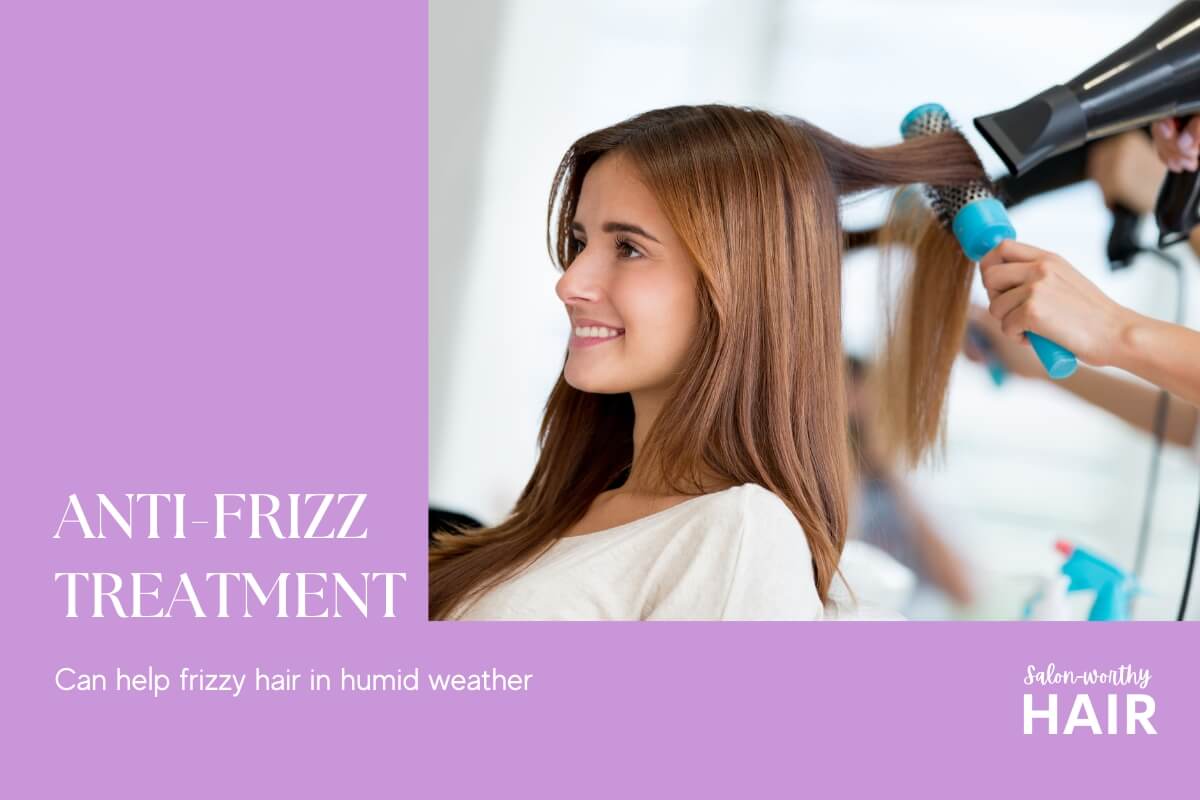
Best treatments for frizzy hair.
10. Rinse Your Hair With Sparkling Water
Rinsing hair with carbonated water is a DIY trick that has gained popularity on TikTok as a quick remedy for frizz, especially in humid conditions.
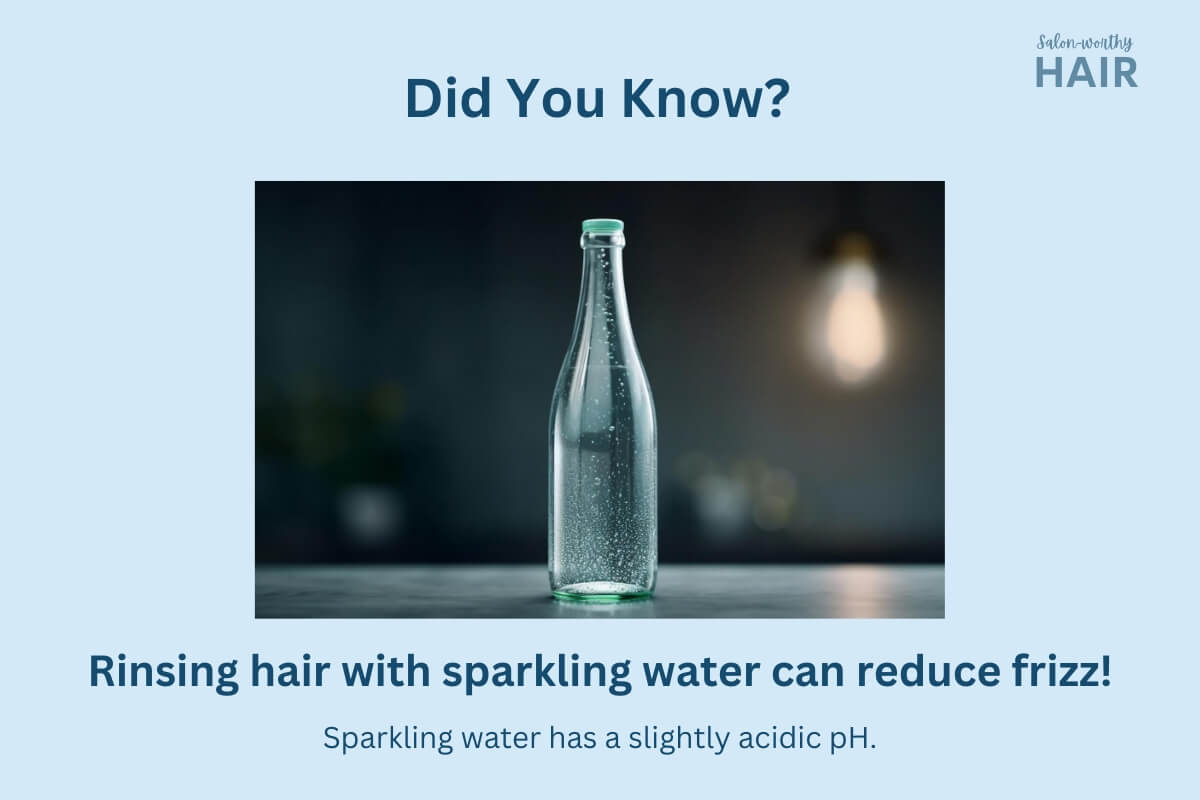
Carbonated water, or sparkling water, has a slightly acidic pH. This acidity can help close and tighten the outermost protective layer of the hair shaft. By closing the cuticles, carbonated water reduces your hair’s ability to absorb excess moisture from humid air, making it less susceptible to the effects of humidity.
To use this method, rinse your hair with carbonated water after shampooing and conditioning. This final rinse helps seal the cuticles, making the hair look smoother.
While this simple home DIY method can offer a temporary solution to combat frizz, it’s essential to note that results can vary based on individual hair types and the quality of carbonated water used. It’s always a good idea to test any DIY method on a small section of hair first to see how it reacts.
10. Check the Frizz Forecast
Frizz forecast is a weather-like forecast that predicts how frizzy your hair will get based on your location’s relative humidity, dew point, wind speed, and rain potential.
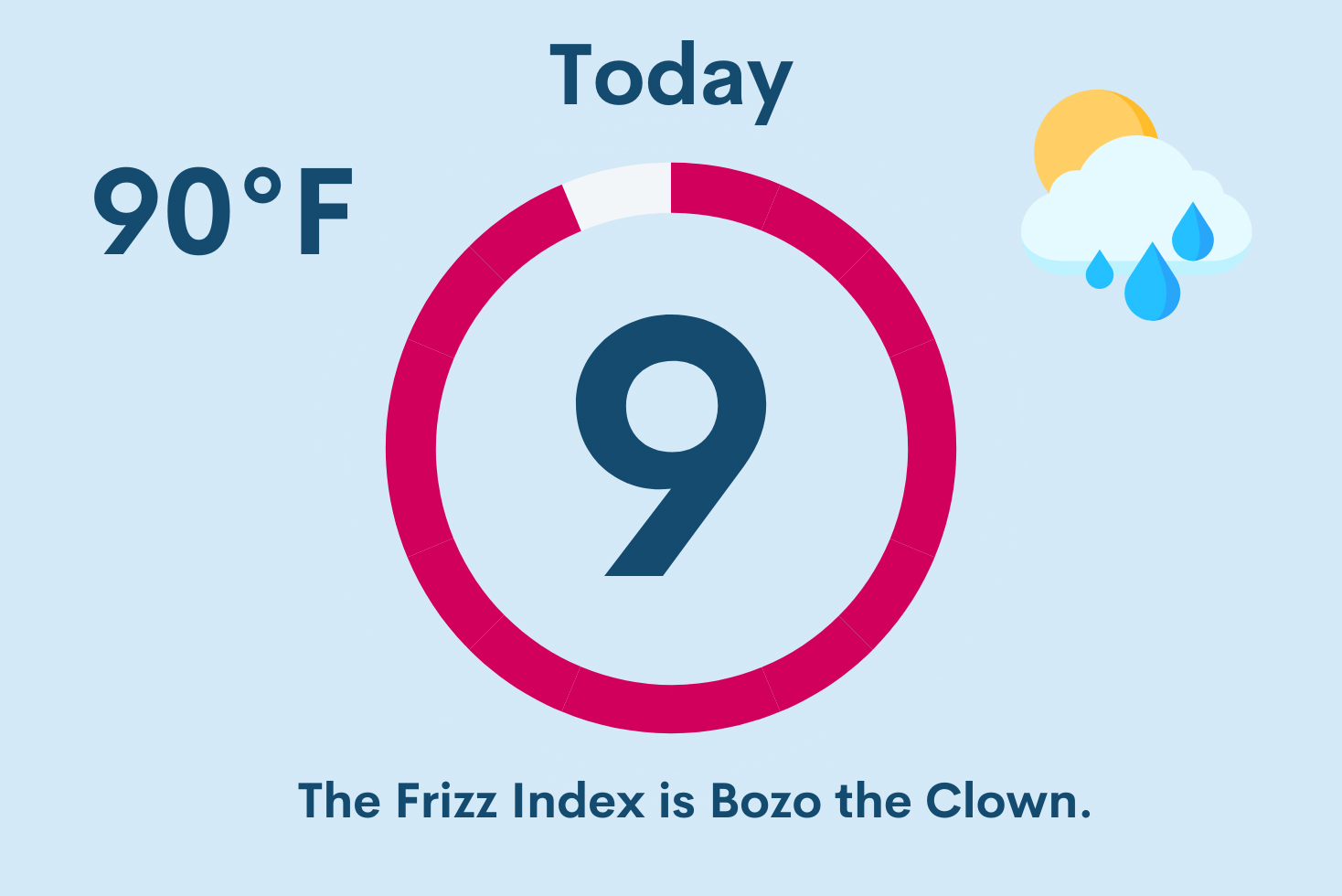
Checking how the weather will be throughout the day can help you avoid getting caught out in a frizzy mess. Specifically, the frizz forecast can give you an hour-by-hour prediction of the frizz index factor ranging from 1 to 10 – with 1 being a low chance of frizz and 10 being a very high chance of frizz.
The frizz forecast app that predicts frizz index.What Are the Best Products for Frizzy Hair in Humidity?
The Color WOW Dreamcoat Supernatural hair spray and the John Frieda Frizz Ease Daily Nourishment leave-in conditioner are the best products for frizzy hair in humidity.
They are anti-humidity hair products designed to create a protective barrier around your hair, helping to lock in moisture and prevent excess moisture from entering the hair shaft. Anti-humidity hair products are suitable for all hair types. They are available in different forms, including hair serums, hairsprays, leave-in conditioners, heat protectants, shampoos and conditioners, curl-defining creams, and silicone-based products.
Make Your Hair Humidity-Proof and Frizz-Free!
High humidity causes hair, especially damaged or curly types, to absorb water and frizz due to disruption to the hair’s hydrogen bonds and its natural propensity to retain moisture.
To fix and stop frizzy hair in humidity, you must keep it adequately moisturized so that it does not seek moisture from the surrounding air. Additionally, you can use anti-humidity hair products to protect your hair from unraveling, create hairstyles that limit the hair’s exposure to humidity, stay as much as possible in air-conditioned spaces, or consider getting a long-term anti-frizz treatment to make your hair humidity-proof.
About the Author
 Charlene Latreuille
Charlene LatreuilleCharlene Latreuille has been blogging for over 10 years and has a background in digital marketing.
Specializing in women's hair health, she blends scientific insight with practical advice, crafting easy-to-follow guides.




